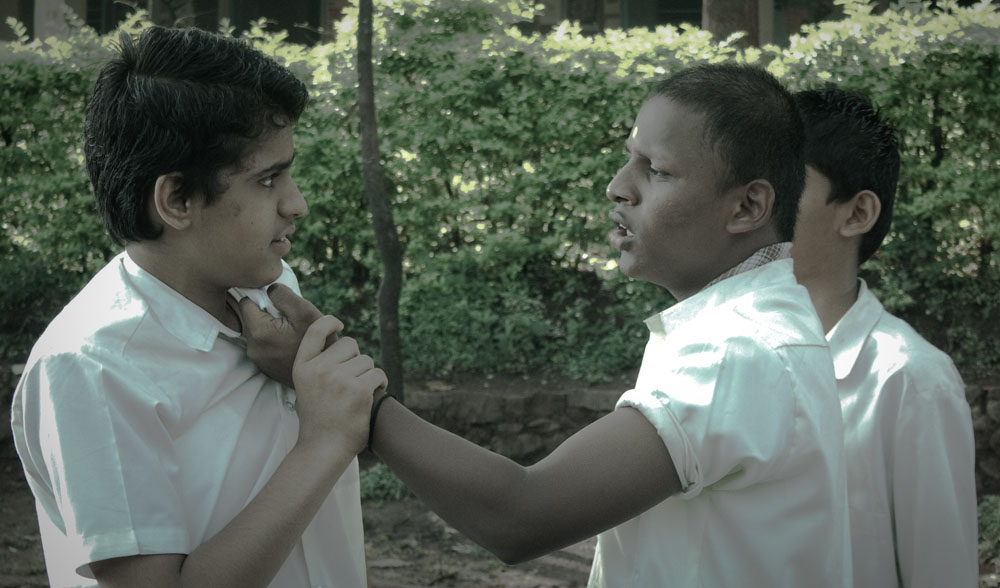Shala reaffirms yet again that Marathi cinema is one of the most happening one in the country, qualitatively at least. The film, based on Milind Bokil’s novel of the same name is a charming coming-of-age film set in a rural area in Navi Mumbai in the emergency period – the mid 1970s.
There is a maturity and gentleness in all aspects of the film, which comes from Avinash Deshpande’s perceptive script, which successfully manages to cinematically convey many scenes which otherwise were quite internal in nature from the central character’s POV. While much of the film is in the ‘shala’ (school), the film shows us there is also a bigger shala outside that one learns perhaps more from – life itself. Especially when you’re 14 and feel the flushes of first love with your classmate! Shala, directed by Sujay Dahake, does have a lot going for it.
Shala looks at India in the emergency period in a rural area near New Bombay. Mukund (Anshuman Joshi) and his friends – all in the 9th standard – hang about their favourite spot doing their homework and generally deliberating their every day life. As the year proceeds, Mukund feels the first flush of love for his classmate, Shirodkar (Ketaki Mategaonkar) and she too seems to reciprocate. Towards the end of the academic year, Mukund’s friend Surya (Ketan Pawar) is accused of misbehaving with a girl and Mukund too is called to the Head-Master’s office as his accomplice. The boys are pardoned but on the day that results come out for the 9th standard, Mukund learns to his dismay that Shirodkar has moved as her father has been transferred. Another friend has failed while one leaves the school. This suddenly leaves Mukund alone going into the 10th standard…
The ambiance and the casting are near perfect. Several small moments leave their mark and have you smiling as the film takes you back to your wonder years and your school days. Nostalgia is a very powerful tooland the film makes full use of it. The narrative flow stays low key and while within the film there are ups and downs, these are not huge crests and troughs and serve all the more to keep the film relatively subtle and highlight the fact that issues, which could be a matter of life and death for a 14 year old, are quite tame in the world of adults. The biggest strength of the film is tracing Mukund’s feelings for his classmate, Shirodkar. This track is wonderfully handled with the looks, glances and smiles between the two working beautifully. The waiting for her at a particular spot, the guessing of film titles, him getting her to come to the temple so he can see her, overcoming initial hesitancy before they begin to talk, his visit to her house – all the sequences are treated in an extremely controlled manner even if there is the occasional ‘filmi’ lapse like going into slow motion for instance.
The performances majorly help with the ensemble cast rising ably to the occasion. But even so, Anshuman Joshi as Mukund is the life and soul of the film. He gets every shade of his character spot on. His goofy grin as he looks on admiringly at Shirodkar has to be seen! He reminds you what a magical age 14 truly was! Ketaki Mategaonkar complements him perfectly. She is the ideal, beautiful girl you want to have your first crush on and she uses her exquisite eyes and extremely disarming smile to solid effect. Ketan Pawar as Surya is a natural scene stealer bringing on the laughs unfailingly each time. The rest of the children do their job most impressively and naturally while the adult cast is more than adequate.
But, the film does have certain areas that needed looking into. Of the group of 4 boys, only Mukund and Surya benefit from well fleshed out characterisations. Consequently, the other two don’t make that much of an impact within the group even if they do all their scenes well enough. Some of the teachers too suffer from cardboard characterizations and obvious on the surface characteristics. Occasionally, it feels as if more attention has gone into their hairstyles and clothes rather than their characteristics. As it is the 70s is an era that borders on being total caricature like if overdone. And the making of the film disappoints you at times with the camera used more like a recording device than being used cinematically. Technically, the focus is also soft at places. The scenes in the Night School and when the two fathers with their sons meet the Head-Master are clumsily staged even though the actors manage to get them by. The morning shot of the village looks like some computer generated image (DI gone wrong?) and is repeated far too often as if it was taken without a purpose and to be used if transitions are to be needed. The editing too needed to linger on to some of the moments. Just that little hold makes so much of a difference sometimes particularly in good, human stories.
Still, the highs easily outweigh the lows and Shala is a rewarding watch. Go for it!
Marathi, Drama, Color


